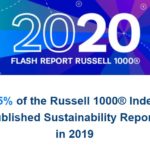By William Baue, Institutional Shareholder.Com
How do German companies fare on sustainability reporting? That is the question posed in a recent report sponsored by the Berlin-based Institute for Ecological Economy Research (IÖW) and Münster-based future e.V. The report, entitled Sustainability Reporting in Germany: Summary of the Results and Trends of the 2005 Ranking, surveyed the 100 largest German industrial and service companies and the 50 largest enterprises in retail, banking, and insurance. Of these 150 companies, only about a third (53) produce stand-alone sustainability reports (not including reports by their parent companies).
The top ten sustainability reports, evaluated on 13 primary social, environmental, and economic criteria and 48 sub-criteria, included those from Henkel (ticker: HEN.DE), adidas-Salomon (ADSN.DE), Volkswagen (VOW), BMW (BMW), and Deutsche Telekom (DT). Henkel, a chemical sector company, scored 494 out of a possible 700 points, with points ranging on a scale from 5 (best) to 0 (worst) in each sub-criterion.
"The [Henkel] report includes exceptional information on product safety and employee issues, and scores best in general reporting requirements," state authors Jens Clausen, Thomas Loew, and Udo Westermann in the report.
The authors also commended Henkel for best practice in its methodology for referring readers to its special sustainability website for more in-depth information. In contrast, the ranking downgraded reports with vague references to web-based information.
"We would not accept ‘Further information on social and environmental matters is available from our website,’ which gives the reader no concrete idea which information he or she may find where," the authors state.
The ranking report noted that the sustainability reports rated much higher on environmental issues than on social issues.
"The results show that today’s sustainability reporting very often is generally an environmental reporting with added on social aspects," states the report, which was translated from the original German. "It is important that companies focus on social aspects in the years to come and develop not only reporting, but as well underlying management systems and performance."
The ranking rewarded adidas-Salomon (454 points out of 700) for its candor in its social reporting.
"Adidas-Salomon (rank 5) presented a credible and fair description of problems and achievements in social supply chain aspects," report states.
The automotive sector performed the best of all sectors, with a mean score of 359 points, compared to the 325 mean score for all companies. Volkswagen scored 448, BMW 417.
The authors contrasted the strong performance in the communications sector of Deutsche Telekom, which earned 412 points, with Thomas Cook, where "we did not find the smallest bit of environmental or social information in the public domain," the authors said.
Non-reporting also plagued the banking sector (six of Germany’s largest banks do not report on sustainability) as well as the chemical sector. For example, Altana AG (AAA), which is listed in the prestigious DAX 30, practices scant sustainability reporting.
"It is regrettable that one of the best stock market performers nearly totally ignores sustainability transparency demands," the report states.
The report places the performance of the companies with the lower-ranked sustainability reports in the larger context, contrasting them with the 28 percent of companies surveyed who do not issue "any piece of information concerning social or environmental issues."
"Really criticized therefore should not be the companies which have average or poor sustainability reports, but those companies who do not issue a report on social and environmental issues or do not make any information at all on these issues public," the report says (in translation from the German).
At the other end of the spectrum, sustainability reports that conveyed the best information in the shortest space were recognized in the report through the "information density" metric, which measures the number of points earned per page. Bosch und Siemens Hausgeräte–a joint venture of Bosch (ZEX.DE) and Siemens (SIEG)–performed the best in this category, scoring 13.3 points per page. Henkel, the top-ranking company overall, was the only other company surveyed to break into double-digits on this metric, earning an 11.0 information density score.



